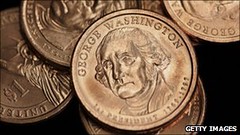
PREV ARTICLE
NEXT ARTICLE
FULL ISSUE
PREV FULL ISSUE
DOLLAR COIN PRODUCTION VIRTUALLY HALTED
The recent news articles about the massive warehouses filled with unused and unwanted dollar coins may have helped tip the scales against the program. This week the U.S. government announced it was halting the bulk of the production of the coins. Here's one of the first articles I saw on the news. Thanks also to John and Nancy Wilson who sent another article along.
-Editor
The White House said Tuesday it is stopping nearly all production of the coins, which carry the likeness of every deceased president. The effort will save taxpayers $50 million a year in production and storage costs. In 2005, Congress passed the Presidential $1 Coin Act, which mandated that the United States Mint issue four new coins each year from 2007 to 2016. But as it turns out, there just wasn't much demand. "Surprising, to my shock and dismay," Vice President Joe Biden said jokingly Tuesday as he announced plans to stop production. The United States Mint had been producing between 70 and 80 million coins per deceased president. But the lack of demand has resulted in nearly 1.4 billion coins -- or 40 percent of those produced -- being returned to the Federal Reserve. Treasury Secretary Timothy Geithner said simply: "That costs money." The White House says the coin surplus will more than meet the demand for the coins for at least a decade. And the Mint will still be required by law to produce a small number of coins for collectors. The announcement is part of a White House campaign to cut back on government waste.
To read the complete article, see:
White House cuts production of presidential coins
(www.boston.com/news/nation/articles/2011/12/13/white_house
Here's an excerpt from an account from The Wall Street Journal.
-Editor
More than 40% of the coins that are minted are returned to the government unwanted, the Treasury said. The rest apparently sit in vending machinesâ€"one of the few places they are widely usedâ€"or in the drawers of coin collectors. What the coins don't do is get around much. In fact, the Mint has never had much luck with dollar coins. The Susan B. Anthony dollar (1979-1981, revived for one year in 1999) never caught on; some people said it was too close in size to the quarter. Neither did the Sacagawea Golden Dollars (2000-2008) or its successor, the Native American $1 Coin, which has the same front but a different back. But that didn't discourage Congress. In 2005, it mandated that the Mint make $1 coins with the likenesses of the presidents, four each year between 2007 to 2016. So far, the Mint is up to James Garfield, the 20th president. Next up: Chester A. Arthur. "And as it will shock you all, the call for Chester A. Arthur coins is not there," Mr. Biden said at a Cabinet-level meeting of a White House campaign to cut government waste. Arthur fans needn't fret. The Mint will keep producing the presidential $1 coins on schedule, but will only make enough to meet collector demand and no longer attempt to circulate them. By law, 20% of all dollar coins produced have to be Native American coins, so production of them will be reduced too.
So are Vice Presidents next? Will they one day make a coin for Veep Joe Biden?
Whenever Mint officials were asked about this before, they basically said "Congress made us do it." So if the law tied the Treasury's hands, what changed to allow the halting of production now? I asked David Ganz, and his take on it is below. Thanks! -Editor David Ganz writes: On Dec. 22, 2005, Pubic Law 109-145 was enacted (31 USC 5112(n)(4)(B) of which provides that "The Secretary [of the Treasury] shall prescribe, on the basis of such factors as the Secretary determines to be appropriate, the number of $1 coins that shall be issued with each of the designs selected for each year of the period referred to...." Evidently, the Secretary made a finding that the Mint was not making a profit on these coins (see below). The announcement of a scaling back of the presidential dollar coin series, and a purported $50-million savings, is a canard that will only wind up costing the American taxpayer money. In the 2010 Annual Report of the Director of the Mint, the seigniorage (or profit made from coin production) is listed as follows (by denomination):
Seigniorage per $1 issued
What this shows is that the presidential dollars have a profit of around half of the face value, on each one produced, while the cent and nickel operate at a loss. (Their accounting makes no sense, either). Under the Mint's unique system of accounting, when you replace coinage, those whose production continues shoulder more of the cost. That is, right now every quarter that is produced costs about 15¢ (seigniorage 10¢). If the cent, nickel and dollar were eliminated, all of the cost would be borne by the dime and quarter, which might then come close to operating at a loss. That's why the State Quarter program that I first proposed in the early 19990's ultimately made a profit for the benefit of the American people of over $5-billion (1999-2009). The more presidential dollars that are made, the more seigniorage (or profit) accrues. That is truly the economics of it.
To read the complete article, see:
The Buck Stops Here: $1 Coins to Be Curtailed
(online.wsj.com/article/SB10001424052970204 The Numismatic Bibliomania Society is a non-profit organization promoting numismatic literature. See our web site at coinbooks.org. To submit items for publication in The E-Sylum, write to the Editor at this address: whomren@gmail.com To subscribe go to: https://my.binhost.com/lists/listinfo/esylum All Rights Reserved. NBS Home Page Contact the NBS webmaster 
|
